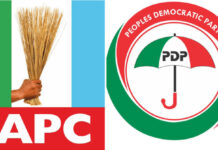States and local government councils in the South West are putting in place structures to ensure financial autonomy for the third tier of government in line with the directive by the Nigerian Financial Intelligence Unit (NFIU).
A survey conducted by the News Agency of Nigeria (NAN) across South West and Kwara state indicated that efforts were being made by the local government councils to open separate accounts from the contentious joint accounts.
Mr Busola Adeyeni, the Chairman of Ife East Local Government Area (LGA) of Osun, said that the state and local government councils in the state are already working on the process of separating their accounts.
Adeyeni said the process of separating the accounts also involves officials of the NFIU and some commercial banks.
He, however, said the process is more complicated than hitherto contemplated and could take time. Adeyeni said the local councils are still operating accounts with the State Governments pending the conclusion of the process.
Corroborating, Mr Adebisi Adejare, the Supervisory Head of Local
Government Councils in the state, said the state would not be left out in granting autonomy to the local councils.
He urged council chairmen to look inward on how they could generate
more money in order to attain complete financial autonomy.
Adejare , however, said autonomy could only be effective when
local government councils look inwards on how to get more Internally
Generated Revenue(IGR) without solely relying on federal allocation.
”The effectiveness of financial autonomy will go a long way in ensuring that people at the grassroots enjoy the dividends of democracy,” Adejare said.
Similarly, Prof. Olajide Bamisayemi, the Head of Political Science
Department, Obafemi Awolowo University, Ile-Ife, said granting financial autonomy to local government councils would boost socio-economic development at the grassroots.
Bamisayemi said if well maintained, the impact would have positive
effect on people at the grassroots level. He said autonomy would also erase the popular belief that local councils were just mere extension of State Governments.
” The prevailing situation where local government councils are being hijacked
by the state governments is not constitutional. So if financial autonomy is not just a mere pronouncement, then financial autonomy will give chairmen freedom to execute projects that will be of benefit to the people.
” I will appeal to the Federal Government to expedite action on financial autonomy for the people to enjoy the dividends of democracy at the grassroots level,” he said.
Mr Bola Taiwo, the President of the Ondo state chapter of the Nigerian Union of Local Government Employees (NULGE), on his part, said that the state had totally complied with the directive on financial autonomy for local government councils.
Taiwo added that Gov. Rotimí Akeredolu had never tampered with local government funds even before the directive.
“Before the directive on financial autonomy, we had a governor that did not even tamper with our money.
“He asked ALGON to cooperate with NULGE so that workers’ salaries and
welfare would be catered for.
“Whenever Joint Accounts Allocation Committee (JAAC) receives any
fund, he would insist that salaries must be paid before anything
because he believes that labour must earn wages,” the labour leader
said.
According to him, local government councils in the state have different bank
accounts although the state government still operates a joint account with the local government councils”because it is constitutional.”
“JAAC is a constitutional issue which nobody can tamper with except the law
is amended,” he said.
In Kwara, the Permanent Secretary of the Ministry for Local Government, Dr Abibat Katibi, said the state government had complied with the NFIU directive on local government autonomy.
She said that that all the local government councils in the state are now
operating separate accounts.
“Each local government council in the state has its own separate account since
the directive was given by federal government; from June 2, they have access to their money,” she said.
She said the state government had been in support of local government council’s autonomy while the state House of Assembly had been in the forefront of the campaign.
Alhaji AbdulYekeen Mahmud, a veteran local government administrator,
however, urged the federal government to set up a special fiscal committee to monitor the activities of the 774 local government councils in the country.
Mahmud, who had served in several local government councils in Kwara
as Director of Personnel Management, said that financial experts and seasoned administrators in the committee should monitor the activities of the local councils to achieve the desired result.
“The problem of financial crime and misappropriation of fund is similar in all the 774 local government councils in Nigeria.
”The committee should be put in place to monitor the local councils’ monthly fund in order to ensure effective usage, ” Mahmud said.
He observed that the financial autonomy granted to local government councils in the past failed because of lack sincerity on the part of operators of the local councils.
In Ekiti state where there are Coordinating Directors for local government councils instead of elected chairmen, the process of implementing the NFIU
directive is unclear.
Many of the Coordinating Directors confirmed that though the new policy is yet to commence in the state, the state government has not been deducting money from their allocation.
The Coordinating Director of Ikole local government council, Mr
Olatunbosun Fasanmi, clarified that though the council is still
operating joint account, separate accounts have been opened for monthly
allocations.
Also speaking, the Coordinating Director of Oye local government
council, Mr Ayodeji Aluko, said that the issue of financial autonomy is a constitutional matter that needed proper documentation before it could be implemented in the state.
Similarly, the Coordinating Director of Ido-Osi local government council, Mr Akinola Adebayo, said his council was equally enjoying ”relative” financial autonomy with management initiating projects without recourse to the state government.
In their separate comments, the Coordinating Directors of Ilejemeje and Moba local government councils respectively, Mr Williams Adeola and Mrs Toba Ojo, corroborated their colleagues, saying Ekiti government had never interfered with councils’ budget.
The state’s Chairman of NULGE, Mr Bunmi Ajimoko, also said there had been no report of mistrust between the state government and the local councils.
The situation in Oyo is also unclear with the dissolution of the 33 local governments councils and 35 Local Council Development Areas(LCDAs) in the state by the Gov. Seyi Makinde’s administration.
The chairmen and councillors were elected on May 12, 2018 with their tenure expiring on May 12, 2021 in line with their contitutional three-year term.
But the governor on his assumption of office announced their dissolution in spite of a pending court injunction restraining the state government from the
dissolution.
Mr Moshood Erubami, the President of Nigeria Voters Assembly(VOTAS),
said that a valid election was conducted into the 33 local governments
and 35 LCDAs in 2018.
Erubami, who is also the Executive Director, Centre for Human Rights and Ethics in Development(CHRED), said the councils are expected to have opened separate accounts by now.
“By now all the heads of local government councils must have been contacted on the new accounts since the system commenced in June 2019 and June
allocation has been paid,” he said
He added that the new governor in the state had in June dissolved the
councils, denying them access to the accounts.
Ayodeji Abass-Aleshinloye, the state’s Chairman, Association of Local
Governments of Nigeria(ALGON), however, said the local councils were still awaiting NFIU directives.
He insisted that all local government councils in the state still have democratically elected chairmen since May 12, 2018.
“We are still operating as local government chairmen, but awaiting the
NFIU directive to be fully compliant,” he said.
But Mr Ramon Olatunde, the Head of Administration in Atiba Local Government Area, said that the state government had frozen all the local councils accounts although money was released for June salary.
Olatunde also said local government councils had yet to have their own
separate accounts except the joint accounts with the state government.
In Ogun, the affairs of the 20 local government councils and the 37 LCDAs are also currently being directed by Heads of Local Government Administration in the state.
The development followed the suspension of all the local council chairmen in
June by the state House of Assembly over allegations of financial impropriety.
The state/local government joint accounts were also frozen by Gov. Dapo Abiodun pending investigation of the allegations.Some of the chairmen, who spoke on condition of anonymity, confirmed that the accounts had remained frozen since the suspension.
The chairmen in separate interviews said the accounts were not closed
but only suspended.
The state Chairman of the Inter Party Advisory Council, Mr Abayomi Arabambi,
however, insisted in an interview that the state government had not complied with the directive of the NFIU.
Arabambi, who called for more effective monitoring of the affairs of the local government councils by NFIU, canvassed for prosecution of state governors who undermine the financial autonomy that the federal government had facilitated for the councils.











